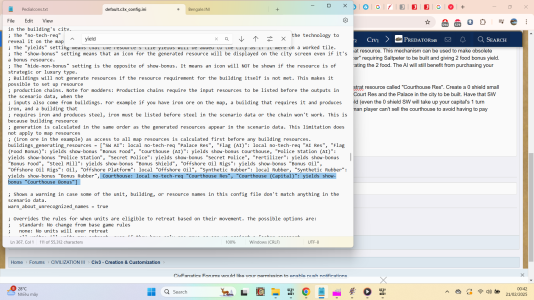Predator145
King
- Joined
- May 22, 2020
- Messages
- 711
If you have a city improvement that generates bonus yield require a resource to be built it will only yield the bonus if the city it's in has access to that resource. This mechanism can be used to make obsolete resources relevant. The AI will appreciate it since they will happily pay a premium for Saltpeter. For example: Have an improvement called "Fertilizer" requiring Saltpeter to be built and giving 2 food bonus yield. You'd need Saltpeter connected to the city to build it. But once Fertilizer is built, the city still needs Saltpeter connected Fertilizer to continue generating the 2 food. The AI will still benefit from purchasing your Saltpeter for the whole game.
You can also use this mechanism to make corruption fighting improvements useful in capital cities. Example: Have the courthouse generate local strat resource called "Courthouse Res". Create a 0 shield small wonder (since there's only 1 of them tied to the capital a SW can't be destroyed via bombardment) called "Courthouse (Capital)" that requires the Court Res and the Palace in the city to be built. That way you and the AI can only build it in a capital city that has a courthouse. Have that SW generate a bonus yield to your taste. I set it at 2 gold and 2 shield and call it "Courthouse Bonus". That IMO is worth the slightly more than 80 shield (even the 0 shield SW will take up your capital's 1 turn production) and 1 gpt maintenance. Because the Courthouse (Capital) SW needs Courthouse Res to continue generating the bonus yield, the human player can't sell the courthouse to avoid having to pay maintenance. And if the courthouse gets destroyed by bombardment, the SW too will temporarily cease working until the courthouse is rebuilt.


The AI benefits greatly from perfumed courthouses and police stations. But the drawback of that is that they will build these in their capitals. This C3X mechanism helps remedy that. And why wouldn't the human player not enjoy building them in their capitals also?
You can also use this mechanism to make corruption fighting improvements useful in capital cities. Example: Have the courthouse generate local strat resource called "Courthouse Res". Create a 0 shield small wonder (since there's only 1 of them tied to the capital a SW can't be destroyed via bombardment) called "Courthouse (Capital)" that requires the Court Res and the Palace in the city to be built. That way you and the AI can only build it in a capital city that has a courthouse. Have that SW generate a bonus yield to your taste. I set it at 2 gold and 2 shield and call it "Courthouse Bonus". That IMO is worth the slightly more than 80 shield (even the 0 shield SW will take up your capital's 1 turn production) and 1 gpt maintenance. Because the Courthouse (Capital) SW needs Courthouse Res to continue generating the bonus yield, the human player can't sell the courthouse to avoid having to pay maintenance. And if the courthouse gets destroyed by bombardment, the SW too will temporarily cease working until the courthouse is rebuilt.


The AI benefits greatly from perfumed courthouses and police stations. But the drawback of that is that they will build these in their capitals. This C3X mechanism helps remedy that. And why wouldn't the human player not enjoy building them in their capitals also?
